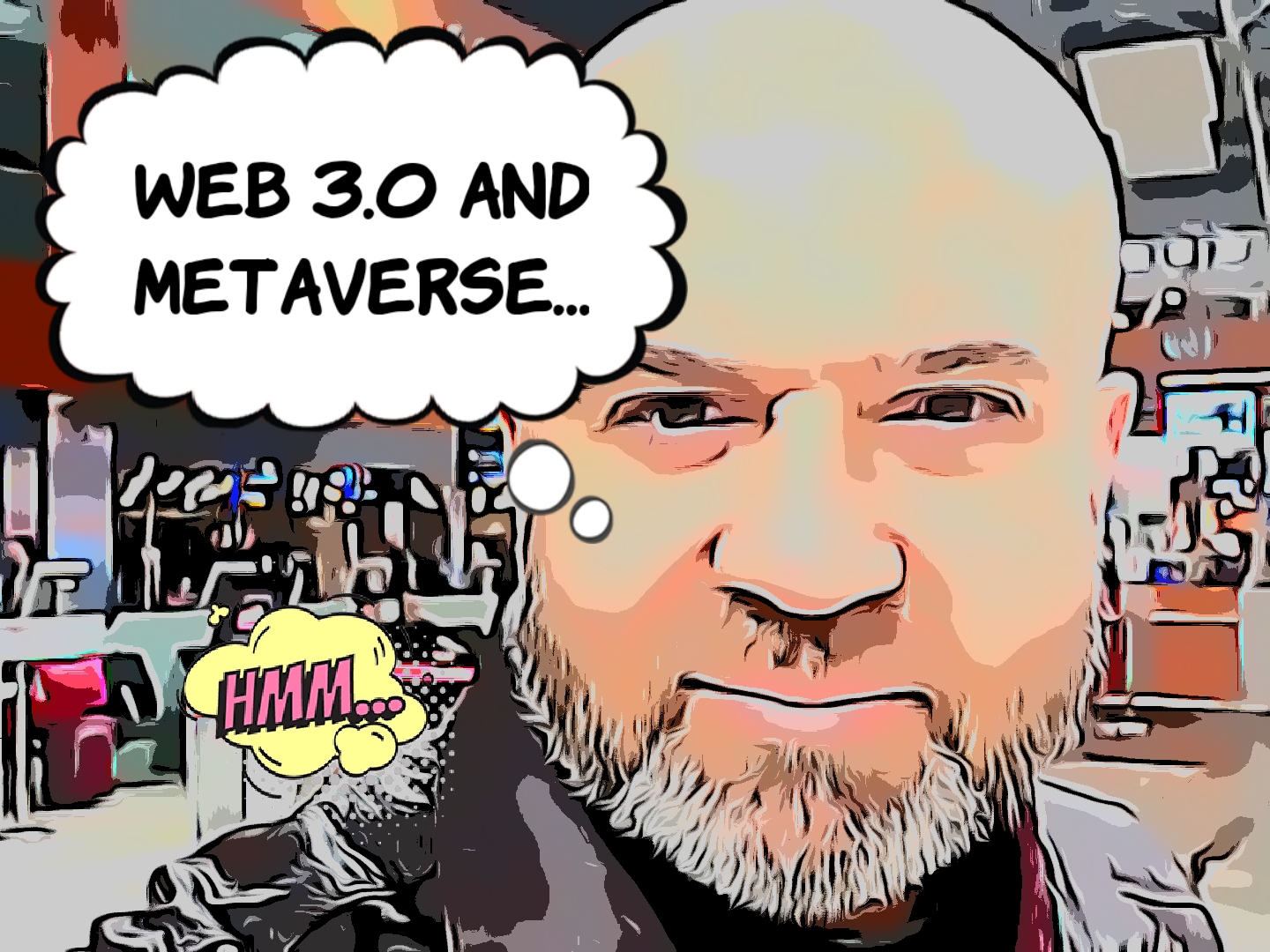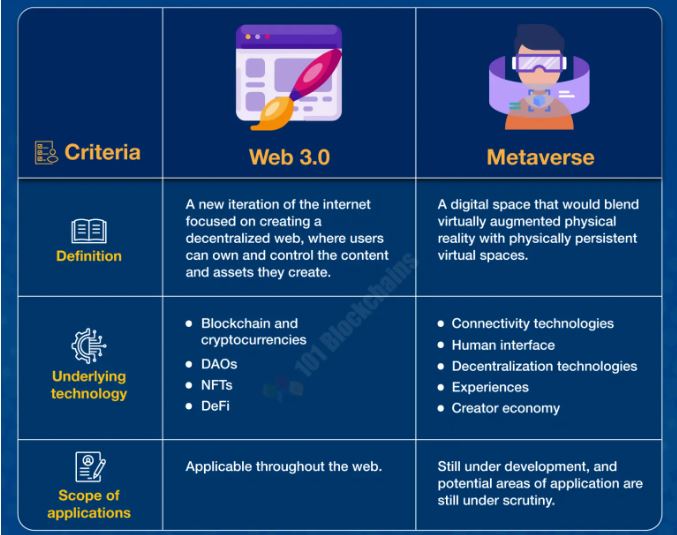
Some concepts that were not in our daily life until a few years ago started to enter our lives. Thanks to the blockchain technology, we started to hear the concepts of Web 3.0 and Metaverse frequently. It seems that they will become an important part of our lives with each passing day. Perhaps we will begin to organize our lives around the concepts of Web 3.0 and Metaverse. Two questions occupy my mind at this stage…
What kind of a world will the concepts of Web 3.0 and Metaverse create for us … ?
How much control will we have over the internet… ?
In this article, we will try to find the answer to these two questions with you...
Let's first understand what the concepts of Web 3.0 and Metaverse are...
What is the metaverse… ?

Metaverse refers to virtual worlds where users can interact with each other and connect more extensively to various applications or services. Metaverse can also be defined as a combination of concepts such as augmented reality, virtual reality, gaming, blockchain and cryptocurrencies. You may have heard of the concept of metaverse even before blockchain technology was this popular. Because this concept was first used by author Neal Stephenson in his 1992 novel Snow Crash. Books and movies such as Ready Player One and The Matrix have made the concept of metaverse widespread.
Today, many metaverse games such as Decentraland and The Sandbox allow users to navigate virtual three-dimensional worlds and create their own content on virtual lands they buy with cryptocurrencies and actually own. Not only that, various companies are already holding meetings in metaverse areas, concerts are held on metaverse platforms, and stores are opening. So the metaverse is building a real world in a virtual environment.
What is Web 3.0 … ?
First, we need to understand the current web 2.0 to understand why Web 3.0 is needed.
Web 2.0; Unfortunately, the internet we use today does not give us the control of any service and interaction to ordinary users. The entire internet, from social media networks to e-mail services, is under the control of big companies. Everything you do is lost when a company stops supporting the app or shuts it down. For example, imagine the photos we uploaded on Facebook fly away…
Web 2.0 also has many question marks in terms of personal privacy. Particularly, the privacy discussions about Facebook were just one example of this. In today's internet, the big companies that control the internet also have control of all our personal information.

Now that you understand the concept of Web 2.0, let's see why Web 3.0 is needed...
Web 3.0 can be defined as Decentralized Internet. Although many innovations, especially the development of social media, have created a more interactive structure for users with Web 2.0, the internet is still controlled by central structures. Web 3.0, on the other hand, promises to eliminate the centralization of servers owned by individuals or companies. This new understanding of the internet aims to establish a structure built on distributed technologies such as blockchain and decentralized autonomous organizations (DAO), decentralized applications. Thus, it gives all online assets and services owned by companies today, which central authorities can intervene, to users who are their real owners.
The idea that created Web 3.0 is to build a more democratic internet. When this happens, no organization or person will be able to control the flow of information online, nor will it be able to destroy a network. In the Web3 structure, the servers on which applications are run and data are stored will be owned by users who have voting rights on what rules and regulations are in effect and how they can be used.
Sometimes people think that Web 3.0 and Metaverse are the same concepts. In order to avoid this misconception, it is necessary to talk about their differences.
There are several reasons to think that Web 3.0 and Metaverse are often the same concepts. Most important; Web 3.0 and Metaverse are still in their early stages. Many companies that develop Web 3.0 and Metaverse projects have started this way with different ideas, and their projects produce different results. For example, Meta (formerly Facebook) said it will spend at least $10 billion developing a metaverse in 2021. But Meta's vision for the Metaverse is very different from those who believe the metaverse should be decentralized. It causes people to be unsure of what both concepts are yet.
The second most important reason for mixing Web 3.0 and Metaverse is; The two concepts are intertwined in various ways. The blockchain technologies used today to build metaverse platforms are also used in the creation of Web 3.0, which includes cryptocurrencies and NFTs.
In what ways do Web 3.0 and Metaverse different… ?
Web 3.0 and Metaverse are different
Web 3.0 and Metaverse are different in concept. Web 3.0 promises a decentralized and more democratic Internet environment as the third major stage in the evolution of the Internet. Metaverse, on the other hand, is a concept that defines alternative virtual worlds to the physical world. So one is a version of today's internet web, while the other is a part of the online world, an online projection of the real world.
Today, both concepts benefit from blockchain technology. Web 3.0 is based on blockchain for its vision of decentralization. However, the concept of Metaverse existed even before the birth of blockchain technology, and online games where users can interact with each other in a virtual world are also considered as Metaverse. In fact, what blockchain technology does is to build a decentralized Metaverse and expand its uses. Today, Metaverse is on its way to becoming a virtual equivalent of the real world, thanks to blockchain technology.
We can say that the concepts of Web 3.0 and Metaverse are fundamentally different. But both are similar in that they use blockchain technology and blockchain concepts like NFT.
Do Web 3.0 and Metaverse technologies have a future … ?
The most curious issue about the Metaverse is how much alternative it can be to the real world. This is where Web 3.0 comes into play. Because we really do own the assets we own in the real world. Metaverse, on the other hand, was far from providing this until the emergence of blockchain technology. We really didn't own either our characters or our items in popular games. If our account was deleted or the games disappeared, we lost everything we owned in these metaverses. Here, while blockchain technology made the concept of Web 3.0 applicable, it also changed the fate of the metaverse. As Web 3.0 develops, the metaverse will come closer to being an alternative world. Because only a completely transparent and decentralized metaverse can be an alternative to the real world.
The future of Web 3.0 and Metaverse technologies is common; In other words, it can be thought that as one develops, the other will develop as well. However, we are still not at that point today. Many early-stage metaverses today are controlled by different service providers.
As we've seen over the past few years, these tech companies often do not protect user interests and data. As many new individuals and organizations enter the metaverse market, it is important to outline the future vision for the metaverse and prioritize the implementation of decentralization and user ownership in this vision of the future. This can be achieved with a set of rules and guidelines that Web 3.0 provides. Both Web 3.0 technologies and Metaverse support each other perfectly.
My Last Words; Metaverse promises a digital space, Web 3.0 a decentralized internet. In this respect, it can serve as the foundation of connectivity in Web 3.0 and the Metaverse. On the other hand, the creative economy in Metaverse could nicely complement the Web 3.0 vision by developing a whole new financial world with the implementation of decentralized solutions. In other words, Web 3.0 and Metaverse technologies have a common future ...
Posted Using LeoFinance Beta
